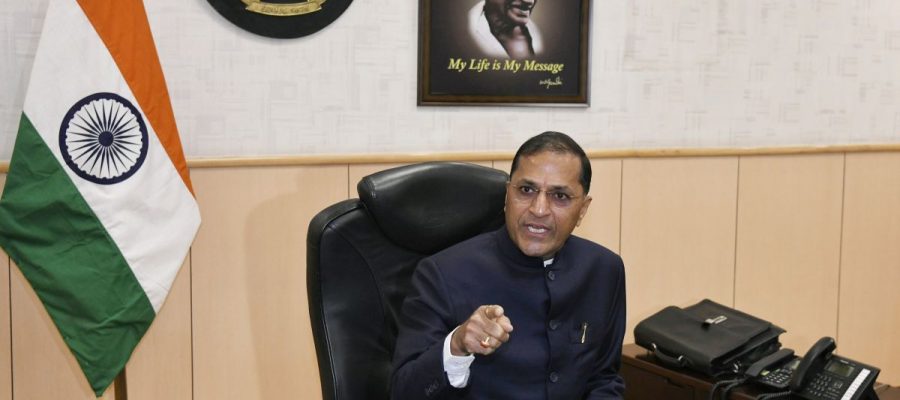The system of ‘selecting’ an election commissioner, which is before the Supreme Court, must be institutionalised.
Aditi Phadnis reports.
A history of concerns — some expressed vocally and publicly, some discussed behind closed doors by bureaucrats and politicians — exists about the freedom and autonomy of the Election Commission of India.
The issue came to a boil recently when the Supreme Court made some scathing observations while hearing a 2018 public interest litigation petition filed by Bharatiya Janata Party leader and advocate Ashwini Upadhyay.
After inspecting official files on November 24, the apex court said the November 18 appointment of Arun Goel as election commissioner was done with ‘ightning speed’, the procedure taking less than 24 hours from start to finish on November 18.
A five-judge Constitution bench, headed by Justice K M Joseph, perused the Centre’s original file pertaining to Goel’s appointment as election commissioner, and said: ‘What kind of evaluation is this? Although, we are not questioning the merits of Goel’s credentials, but the process itself.’
Justice Ajay Rastogi, who was also a part of the bench, told Attorney General for India R Venkataramani: ‘You have to listen to the court carefully and answer the questions. We are not on individual candidates, but on the process.’
The Bench has since reserved its judgment.
“The process of appointing an election commissioner is as important for the freedom and independence of the Commission as the individual himself,” says former chief election commissioner Shahabuddin Yaqoob Quraishi.
He also raises important issues about the power asymmetry between the CEC and other commissioners, which are yet to be resolved. The PIL raises many questions against a background of moves made by governments of different complexions while appointing election commissioners.
For instance, former member of Parliament and Union minister, the late Jaswant Singh, flagged the 2005 appointment of Navin Chawla as election commissioner, and in his capacity as Leader of Opposition, met the President of India with a memorandum signed by 205 MPs from the Opposition National Democratic Alliance in 2006, asking him to direct chief election commissioner Brij Bihari Tandon to recommend Chawla’s removal.
According to Article 324(5) of the Constitution, only the CEC can recommend removal of an election commissioner, which, says Quraishi, is in itself a weapon which threatens the ECI’s independence as an institution.
Chawla, however, continued in his post, because the government argued that all the actions that the Opposition alleged made Chawla ‘unfit’ for the position had taken place before Chawla became election commissioner.
This was followed by another move that has long-standing implications: The government blocked references from the President to the CEC, allowing the First Citizen only to communicate with the prime minister and council of ministers.
In parallel, Tandon said he was not allowed to act on the Opposition memorandum without a reference from the President.
But the situation reversed in 2007.
N Gopalaswami, who had been L K Advani’s home secretary, became CEC and he informed the Supreme Court via an affidavit that should he receive complaints or petitions against election commissioners, he could take suo motu action against them by virtue of powers vested in him by the Constitution.
However, by the time the matter could be heard, elections were round the corner and in 2009, when the Congress-led United Progressive Alliance returned to power for a second term, the matter became irrelevant: Though no less germane to the independence of the ECI.
The issue resurfaced in 2019, this time when a BJP-led government was in power. Sunil Arora was CEC and Ashok Lavasa and Sushil Chandra the other election commissioners. When Lavasa sought to record his view — that some speeches made by Prime Minister Narendra Modi and Home Minister Amit Shah violated the Model Code of Conduct — the CEC ruled that minority views can be recorded only in quasi-judicial proceedings and as decisions on code of conduct rules are not quasi-judicial, they need not be recorded.
At this, Lavasa stopped attending meetings on Model Code of Conduct violations. He wrote a letter that read: ‘I might consider taking recourse to other measures aimed at restoring the lawful functioning of the Commission in terms of recording minority decisions.’
‘My various notes on the need for transparency in the recording and disclosure of all decisions, including the minority view, have gone unheeded, forcing me to withdraw from participating in the deliberations on the complaints.’
Quraishi says actions like this have undermined the ECI’s independence.
‘If it is the contention that CEC has more powers than the election commissioners, then it is not inconceivable that the two election commissioners could join hands to force the CEC to take one or the other decision. The perils of this are obvious.’
Several former election commissioners who spoke to Business Standard said the imbalance in power is one part of the problem. But also, the system of ‘selecting’ an election commissioner, which is before the Supreme Court, must be institutionalised.
Hence, the need for a collegium that decides on the appointment of the election commissioner.
The government’s contention is that there was no undue haste in Goel’s appointment. It was done in the same way that other public appointments are done.
Law Minister Kiren Rijiju went a step further to state that the observations of a court were different from its orders. ‘A judge must speak through his judgment,’ he said at a public event as an observation by a judge could lead to a ‘difficult situation’.
While India awaits the order of the Constitution bench, the ECI’s actions are bound to be watched closely.
Source: Read Full Article

